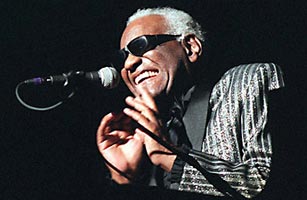
Almost alone among the first kings of rock 'n' roll, he was a grownup. Where Elvis and his brethren set the image of the rebellious teen, singing about what they wanted to do, Ray Charles -totally blind from age 7, raised in an orphanage, then on the road and on his own from 17-sang about what he had been through. His voice rasped like a man whose heart is in his throat and has just been broken. "Sinatra, and Bing Crosby before him, had been a master of words," Henry Pleasants wrote in The Great American Popular Singers. "Ray Charles is a master of sounds." Wailing or grunting, he sang the blues with a gospel intensity, and his piano was the 88-key choir that shouted back. He shocked the faithful by secularizing old church songs-turning This Little Light of Mine, say, into This Little Girl of Mine. But that's just what rock did: blend Sunday-morning fervor with Saturday-night fever. As restless a music lover as he was a womanizer, Charles became a rock star with the epochally orgasmic What'd I Say, attacked pop standards and country songs with an inspired musicianship, refashioned America the Beautiful into an iconic hymn. He toured for decades, radiating an indefatigable electricity. For all the perks of stardom-the money, the women, the heroin (which he kicked in the '60s), the ubiquitous nickname "genius"-Charles never regained his sight. He still couldn't see that little light. He had to be it. And for a half-century he was.